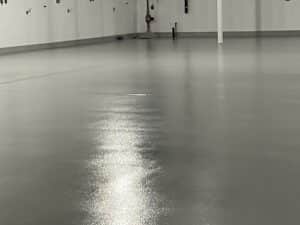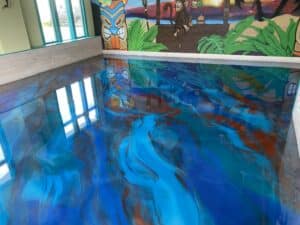Introduction
When you’re looking to transform your space, whether it’s a home, office, or commercial area, epoxy floor coating stands out as a remarkable choice. It’s not just about making floors look good—epoxy coating is about durability, sustainability, and smart design.
Epoxy is essentially a type of resin that, when mixed with a hardener, forms a strong, durable coating over your floor. This process creates a surface that’s not only tough but also resistant to most types of damage that floors usually endure: spills, stains, cracks, and heavy foot traffic. But the benefits don’t stop there.
Epoxy floors are a sustainable choice, perfect for the environmentally-conscious architect or builder. They are cost-effective, reducing the need for frequent replacements or repairs, and contributing less waste to our planet. Plus, they offer a variety of designs and finishes that can enhance the look of any space while meeting eco-friendly standards.
The Top 5 Benefits of Epoxy Floor Coating:
1. Durability: Resists wear and tear, making it last longer than other floor types.
2. Strength: It can handle heavy loads, perfect for garages and industrial spaces.
3. Chemical Resistance: Defends against spills from oils, gases, and other substances.
4. Easy Maintenance: Simple to clean, requiring less effort and fewer harsh chemicals.
5. Aesthetic and Customizable: Offers a range of colors and finishes to match any design vision.
For those navigating the sustainable building landscape, epoxy flooring emerges as an excellent fusion of aesthetic appeal and environmental responsibility. It’s a solution that satisfies both the demands of clients and the necessary criteria for green building certifications.

Understanding Epoxy Floor Coating
Diving deeper into the realm of epoxy floor coating, grasp not only its benefits but also the preparation and types of coatings available. This knowledge ensures you select the right option for your space, whether it’s a garage, warehouse, or industrial facility.
Types of Epoxy Coatings
Epoxy coatings come in various types, each tailored for specific uses and environments:
- Industrial Epoxy Coatings: These are designed for heavy-duty environments. They withstand high traffic, heavy machinery, and spills, making them ideal for factories and warehouses.
- Automotive Epoxy Coatings: Tailored for garage floors, these coatings resist oil, gasoline, and other chemicals typically found in automotive settings.
- Clear Polyurea: A variant of epoxy, polyurea coatings are known for their fast curing time and UV resistance, making them suitable for areas exposed to sunlight.
- Moisture Cured Urethane: This type excels in humid environments, providing excellent moisture resistance compared to traditional epoxy coatings.
Understanding the specific characteristics of these coatings, such as durability, strength, and chemical resistance, helps in making an informed decision that best suits your needs.
Preparing for Epoxy Coating
The key to a successful epoxy coating application lies in thorough preparation:
- Surface Preparation: The concrete floor must be clean, dry, and free of any contaminants. This step may involve sweeping, vacuuming, or using a degreaser on oily spots.
- Crack Filling: Any cracks or chips in the concrete need to be filled and smoothed out. This ensures a uniform surface that will hold the epoxy coating evenly.
- Grinding: For the best adhesion, the surface should be ground with a diamond grinder or shot blasted. This process creates a rough texture, allowing the epoxy to grip onto the surface more effectively.
Proper preparation is crucial; it directly influences the coating’s longevity and performance. Skipping or rushing through these steps can lead to peeling, bubbling, or other forms of failure, compromising the floor’s durability and appearance.
In summary, understanding the types of epoxy coatings and the necessary preparation steps is essential for achieving a durable, strong, and chemically resistant floor. Whether it’s for an industrial setting, a garage, or any space requiring a resilient flooring solution, epoxy coating offers a versatile and reliable option.
Always remember, the key to maximizing the benefits of an epoxy floor lies in choosing the right type of coating and ensuring meticulous surface preparation.
By keeping these factors in mind, you’re well on your way to transforming your space with an epoxy floor that combines aesthetics with unparalleled functionality.
Next, let’s explore the pros and cons of DIY versus professional epoxy application to help you decide the best approach for your project.
DIY vs. Professional Epoxy Application
When it comes to applying epoxy floor coating, you have two main routes: the do-it-yourself (DIY) approach or hiring professional services. Each option has its own set of benefits and challenges. Let’s dive into how to choose the right epoxy kit and when to consider professional services for your project.
Choosing the Right Epoxy Kit
DIY Kits:
- Leggari Learning Center: If you’re leaning towards DIY, the Leggari Learning Center is a fantastic resource. They offer tutorials and guides that simplify the epoxy application process. This is especially helpful for beginners.
- TrueLock DIY Kit: TrueLock offers a range of DIY epoxy kits that are user-friendly and come with detailed instructions. These kits are designed for those who want to take on the project themselves but still achieve a professional-looking finish.
- AWF Polyurea Kits: AWF kits are another excellent option for DIY enthusiasts. They are known for their durability and ease of application. Plus, they come with a comprehensive guide to help you through the process.
- Rockhard USA Kit: For those seeking something a bit more robust, the Rockhard USA Kit is designed for heavy-duty use, making it a great choice for garages and industrial spaces.
Professional Services:
While DIY kits can be a cost-effective and satisfying way to apply epoxy, professional services offer a level of expertise and precision that is hard to match. Here are some reasons why you might choose professional installation over DIY:
- Expertise and Experience: Professionals come with years of experience and knowledge. They can handle any unexpected issues that arise during the application process.
- Quality of Work: Professionals ensure a smooth, even application with no bubbles or missed spots. Their work often comes with a warranty, giving you peace of mind.
- Time-Saving: Hiring professionals can significantly reduce the time your space is out of commission. They have the tools and team to get the job done quickly and efficiently.
Making the Decision:
- Consider Your Skill Level: If you’re comfortable with home improvement projects and willing to learn, a DIY kit might be right for you. However, if you’re looking for a flawless finish and don’t have the time or patience to learn, professional services are the way to go.
- Evaluate the Project Size: Small projects might be manageable on a DIY basis, but larger areas or commercial spaces often require the expertise of a professional team.
- Budget: DIY kits can be more budget-friendly upfront, but remember to factor in the cost of any mistakes that might require professional correction later. Professional services might seem more expensive, but they come with the assurance of quality and durability.
In the end, whether you choose a DIY kit or professional services, the key is to ensure proper surface preparation and follow the application instructions closely. This will set the foundation for a stunning and durable epoxy floor, transforming your space just as you envisioned.
Next, we’ll look into the advantages and disadvantages of epoxy flooring to give you a clearer picture of what to expect with your new floor.

Advantages and Disadvantages of Epoxy Flooring
Epoxy flooring is a popular choice for both commercial and residential spaces. But like any flooring option, it comes with its own set of pros and cons. Understanding these will help you make an informed decision about whether it’s the right choice for your space.
Addressing Common Concerns
Safety: One of the top advantages of epoxy flooring is its safety feature. It’s slip-resistant, which reduces the risks of accidents in your space. This is especially important in areas that are prone to wet conditions.
Aesthetics: Epoxy flooring can transform any dull, lifeless space into a vibrant area. With a variety of colors and patterns, including metallic and solid colors, it offers a sleek, high-gloss finish that can significantly enhance the look of your space.
Disadvantages: While epoxy flooring has many benefits, there are some disadvantages to consider. It can be a bit of a process to install, requiring thorough surface preparation and drying time. Also, if not properly installed, epoxy flooring can peel or crack over time.
Contact Noise: Epoxy floors can be noisier than other flooring options. They can produce a hollow sound when walked on, which might be a consideration if noise is a concern in your space.
Temperature Sensitivity: Epoxy flooring is sensitive to temperature. It needs to be applied in a controlled environment to ensure it cures properly. Extreme temperatures can affect its durability and appearance.
Cracks Visibility: If your concrete floor has cracks, epoxy can cover them up. However, if the floor shifts or settles, those cracks might reappear. To prevent this, proper floor preparation and crack filling are crucial before applying epoxy.
Unevenness: Epoxy is a self-leveling product, but it requires a level surface for best results. Uneven floors might need additional preparation work to ensure the epoxy coating applies evenly and looks its best.
Longevity: When properly installed and maintained, epoxy flooring can last for many years. It’s durable against wear and tear, making it a long-term flooring solution for many homeowners and businesses.
In summary, epoxy flooring offers a durable, safe, and aesthetically pleasing option for many spaces. However, its installation and performance can be affected by factors like temperature sensitivity, potential for noise, and the condition of the underlying floor.
Proper installation and maintenance are key to ensuring the longevity and beauty of your epoxy floor. Understanding these advantages and disadvantages will help you decide if epoxy flooring is the right choice for your space.
We’ll dive into the maintenance and longevity of epoxy floors, offering tips on how to keep your floor looking its best for years to come.
Maintenance and Longevity of Epoxy Floors
Epoxy floors are known for their durability and long life. But like anything worth having, they require a little care. Let’s talk about how to keep your epoxy floor coating in top shape.
Ensuring Long-Lasting Results
Cleaning
Epoxy floors are super easy to clean. A simple sweep and a mop with a pH-neutral cleaner is all you need. Avoid harsh chemicals that can damage the coating.
Maintenance
Regular check-ups can prevent big problems. Look out for any signs of wear or scratches. Quick fixes can make a big difference in the floor’s appearance and longevity.
Reapplication
Even the toughest floors need a touch-up now and then. Depending on the traffic and use, you might need to reapply the top coat every few years to keep it looking fresh.
Hot Tire Pickup
This is a fancy way of saying that sometimes, tires can leave marks on your floor. The good news is, proper floor prep can prevent this. Make sure the installation includes a top-quality top coat designed to resist this type of marking.
Surface Testing
Before installation, it’s crucial to test the concrete surface for moisture and other issues. This step ensures that the epoxy adheres properly and lasts longer.
Proper Installation
A flawless install is key to a floor that stands the test of time. Hiring professionals with experience in epoxy floor coating can make all the difference. They know how to prep the surface, apply the epoxy, and finish with a top coat that seals the deal.
Top Coat Application
The top coat is like a shield that protects your floor from damage, stains, and fading. Choosing a high-quality top coat and applying it correctly will add years to your floor’s life.
In conclusion, taking care of your epoxy floor is straightforward. Regular cleaning, maintenance, and the occasional reapplication will keep it looking great. The secret to a long-lasting epoxy floor lies in proper installation and the right top coat. With these steps, you can enjoy a beautiful, durable floor for years to come.
Next, we’ll explore sustainable design options with epoxy coatings and how Topcoat Services can help you select the best epoxy coating for your needs.

Conclusion
Selecting the Best Epoxy Coating for Your Needs
As we wrap up our comprehensive guide to epoxy floor coating, it’s important to highlight the final steps in your journey to transforming your space. Selecting the right epoxy coating isn’t just about the immediate benefits. It’s also about aligning with sustainable design, understanding the environmental impact, considering the specific areas of application, and adhering to your budget. Let’s break these down:
Sustainable Design:
Making eco-friendly choices is more important than ever. Epoxy floor coatings stand out as a sustainable option. They are long-lasting, reducing the need for frequent replacements and consequently reducing waste. Plus, their durability means less use of harsh cleaning chemicals, aligning with a greener lifestyle.
Topcoat Services:
Choosing the right partner for your epoxy flooring project is crucial. At Topcoat Services, we are committed to delivering not just stunning and durable floors but also solutions that are tailored to your specific needs. Whether it’s a commercial space or a cozy corner in your home, we have the expertise to guide you through the selection process, ensuring that your floor reflects your style and meets your expectations.
Environmental Considerations:
Epoxy coatings are a friend to the environment, but some options are greener than others. For instance, opting for a low-VOC (volatile organic compound) epoxy can minimize the impact on indoor air quality. Furthermore, considering the entire lifecycle of the product can help in making a choice that’s truly eco-conscious.
Application Areas:
The area where you plan to apply the epoxy coating plays a significant role in your selection process. High-traffic areas demand a more robust solution, such as a 100% solids epoxy, which can endure heavy use without compromising on aesthetics. On the other hand, spaces with less foot traffic might be suited to a water-based epoxy, offering easy application and maintenance.
Budget Considerations:
While it’s tempting to choose the most cost-effective option, consider the long-term implications. Cheaper epoxies might save you money upfront but can end up costing more over time due to the need for frequent repairs and reapplications.
Investing in a high-quality epoxy floor coating from a reputable provider like Topcoat Services ensures that you’re getting the best value for your money, with a floor that stays beautiful and functional for years to come.
In conclusion, your journey to a new epoxy floor is a significant investment in your space. By considering sustainable design, partnering with Topcoat Services, and carefully weighing environmental factors, application areas, and budget, you’re well on your way to making a choice that you’ll be happy with for years to come. Let us help you transform your space with an epoxy floor coating that meets all your needs.









